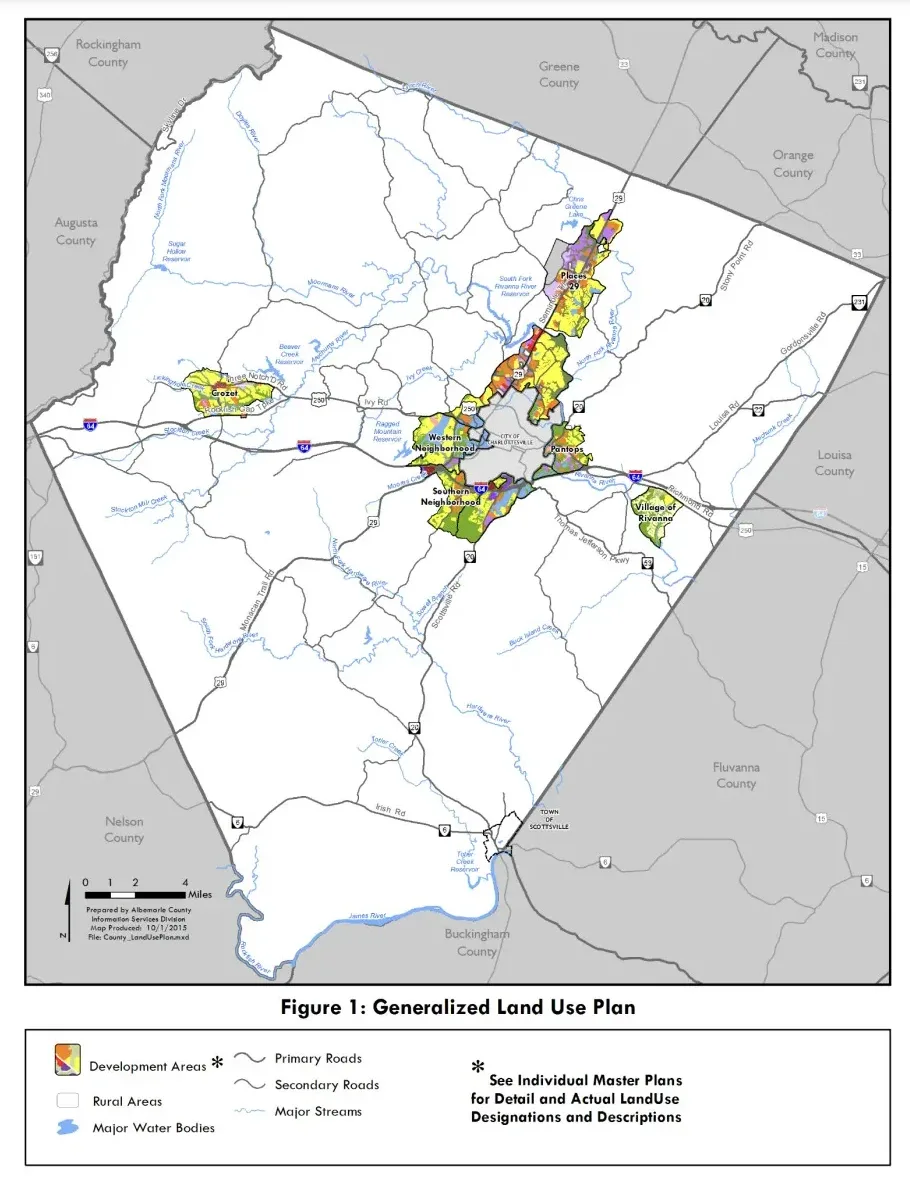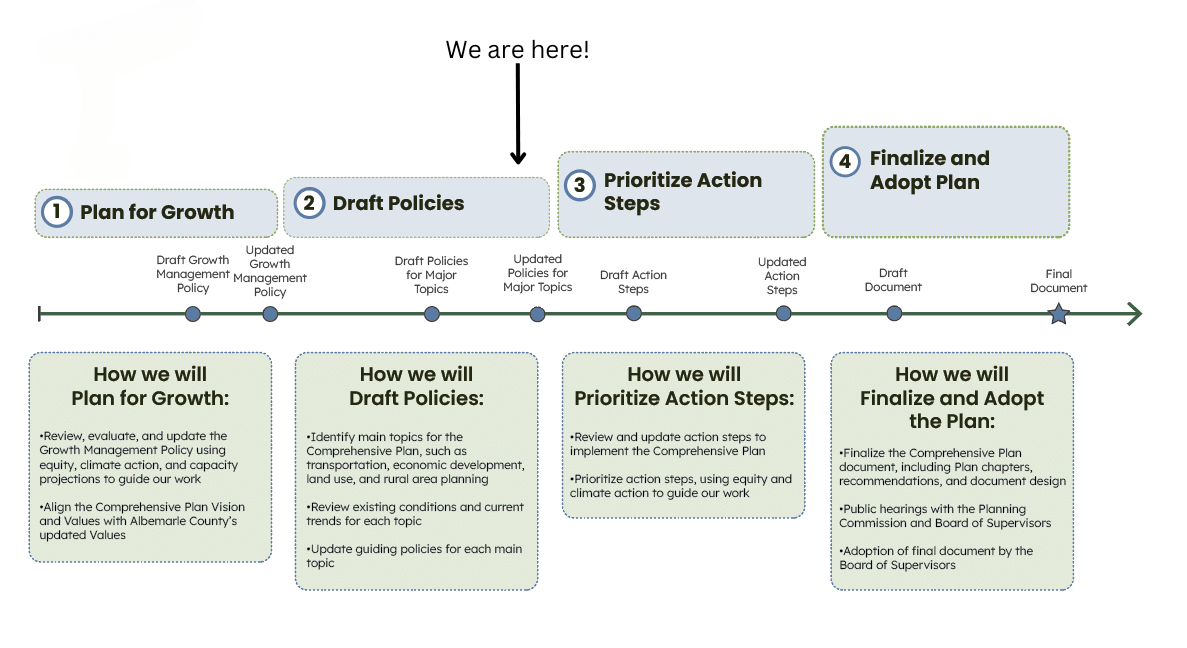The following text was sent out via email on November 16, 2023. Sign up for PEC email alerts →

Albemarle County sunset over State Route 20 and I-64 interchange. Photo by Hugh Kenny/PEC
Dear Supporter,
As we settle into fall activities that remind us of the vibrant beauty and benefits of the natural and scenic spaces that exist in Albemarle and Charlottesville, it’s easy to overlook that these are not a given – they only exist through deliberate efforts to plan for, maintain and protect them.
With this in mind, PEC is urging County leaders to incorporate seven recommendations into its update of the AC44 Comprehensive Plan, a document that will guide decisions on growth and development, rural area protection, conservation of natural resources, climate action, transit and walkability, affordable housing, and more for the next 20 years – until 2044.
As Albemarle County goes through this planning process, your direct participation in the future planning of our community has never been more important.

Map of Albemarle County showing areas designated for development (Development Areas) in colors. Source: 2015 Albemarle County Comprehensive Plan
PEC’s Vision for Albemarle County:
We envision Albemarle County with the majority of its rural lands permanently protected, with intact natural and cultural landscapes, healthy waters, and working farms and forests that nourish vibrant, diverse communities where residents across all walks of life participate in decisions about its future.
We envision the County’s urban areas as thriving, mixed-use, walkable communities with everyday access to open spaces, parkland, and recreational opportunities.
We envision a County that is sustainable, resilient, innovative, equitable, and one that leads by example on inland climate mitigation and adaptive planning.
In order to make our vision a reality, PEC has seven recommendations for the Planning Commission and Board of Supervisors to consider and adopt:
- Include a Rural Area chapter: The County has done this in the past two comprehensive plans, and should do so again, as a separate chapter is necessary to address the complex interrelationships of natural and cultural resources and rural communities unique to Albemarle’s Rural Area.
- Include a strong recommendation for the creation of a Rural Area Plan: A Rural Area Plan is a master plan that provides a long-term vision for sustaining working farms and forests, natural resource protection, protection of water supplies, thriving communities, historic preservation, outdoor recreation, and tourism. We should continue to plan as intentionally for rural areas as we do for the Development Areas.
- Include a recommendation for the establishment of a Development Areas Task Force: This would address the obstacles to accommodating projected growth in the current Development Areas by analyzing whether existing Development Areas are achieving a mix of uses, higher density, walkability, redevelopment, accommodation of growth, and accessible quality open spaces — before the County considers any expansion of the Development Areas.
- Do not prematurely identify future potential development area expansions: Mapping potential future expansion of Development Areas is ill-advised and would likely lead to the acceleration of land speculation and its associated negative impacts, such as rising land prices, higher housing costs, and unnecessary expansion of infrastructure and services.
- Limit the proposed future small area plans for the I-64/US250 Yancy and I-64/US250 Shadwell interchanges: This is needed to avoid inappropriate development extending into the Rural Area.
- Include strong recommendations for a consistent and dedicated funding source for the land conservation and purchase of development right (PDR) programs: This funding would help protect Albemarle’s water resources and drinking water supplies, as well as the rural areas where they originate, and support biodiversity conservation and climate action.
- Include an updated Historic Preservation Plan and a Historic Preservation Ordinance: Cultural landscapes, districts, sites, and buildings that contribute to the rural quality of life and that support our local economy require greater attention and protection.
Focus on the Future
You can find further explanation of PEC’s current AC44 policy priorities on our website. They include:
- Conserving the natural systems, open spaces, and communities in the Rural Area
- Creating stronger, more sustainable urban centers and neighborhoods in the Development Areas
- Protecting water resources
- Supporting affordable housing implementation
- Shaping and advancing our clean energy future
These priorities are informed by our climate action work and Climate Action Platform in Support of a Climate-Ready Albemarle County. The priorities are also responsive to the County’s Risk and Vulnerability Assessment.

The County will be in Phase 2: Drafting Policies for Major Topics until the end of the year, with key Planning Commission work sessions focused on Housing and Economic Development on Nov. 14 and Land Use, Transportation, and Community Facilities on Dec. 19, 2023. Honing the document, however, will continue into next year as Action Steps are drafted and the plan finalized and adopted by December 2024. You can get PEC alerts about AC44 or sign up for the County’s updates.
Get Involved with Albemarle County’s Comprehensive Plan:
- Submit Comments in Writing: Public comments should be sent to the Albemarle County Board of Supervisors at [email protected] and the Planning Commission at [email protected].
- Meet with your Supervisor and Planning Commissioner: Contact your Supervisor and Planning Commissioner and share your perspective on what you love about Albemarle and your concerns. Find your magisterial district here.
- Attend Board of Supervisors and Planning Commission Work Sessions and Public Meetings: Showing up in person demonstrates to elected officials that their citizens are paying attention to the decisions that impact them.
- Speak Up: Citizens can speak for three minutes at the start of every Board of Supervisors and Planning Commission meeting to have their voice heard.
- Stay Informed and Engaged: This is a long process that has the potential to impact every facet of life in Albemarle County for the next 20 years. Sign up for PEC’s AC44 email alerts, the County’s Engage updates, and review PEC’s AC44 Comprehensive Plan Policy Platform and Climate Action Plan.
- Make Connections: Talk to your friends, family, and community about an area that interests them – whether they care about mixed-use housing types or scenic views looking out over a mountain, there is something for everyone to be passionate about.
These topics are wide-reaching and nuanced, and many of them influence each other. PEC continues to show up to speak and advocate, to learn and to listen, and to ask tough questions. We engage with public officials at Planning Commission, Board of Supervisors, and Community Advisory Committee (CAC) meetings, with residents at community meetings, informal gatherings, and neighborhood events, and with County staff and allied environmental organizations. That being said, we want to stress the importance of citizen engagement in planning for the future of the County. Your perspective matters and we strongly encourage you to join the conversation in any way you feel able.
Thank you!
Rob McGinnis, PLA FASLA
Senior Land Use Field Representative
Albemarle & Greene Counties
[email protected]
(434) 962-9110
